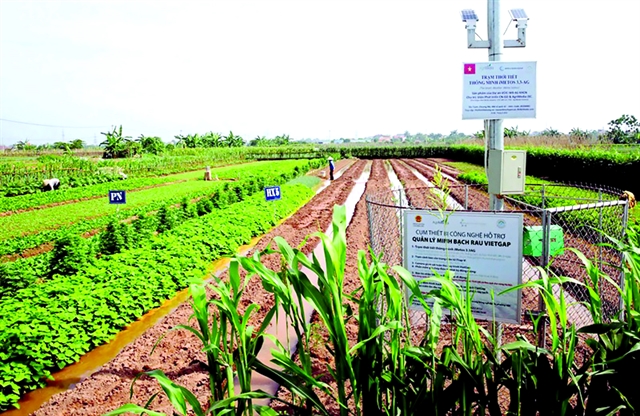 Society
Society

 |
| Promoting digital transformation in agricultural production has helped reduce costs and labour efforts.— Photo courtesy of the Hà Nội Department of Agriculture and Environment |
HÀ NỘI — Hà Nội has been accelerating its digital transformation in the agricultural sector, actively applying technology from automated irrigation systems on suburban fields to smart greenhouses equipped with sensors and robotic devices.
The efforts are helping reduce labour, save water and agricultural inputs, improve product quality and open new doors to domestic and international markets.
Across the capital’s fields, scenes of technological innovation are becoming increasingly familiar in recent years, drones spraying fertilisers and pesticides, automated drip irrigation systems and smart greenhouses that control light, temperature and humidity automatically.
The innovations are not only transforming rural landscapes but also reshaping urban agriculture in areas of Chuyên Mỹ, Đông Anh, Gia Lâm and Đan Phượng.
Modern greenhouse models equipped with automated irrigation systems and environmental sensors are enabling stable, high-quality vegetable production even in the suburban zones of the capital.
Nguyễn Đình Hoa, Deputy Director of the city’s Department of Agriculture and Environment said digital transformation models are expanding rapidly across the city and delivering long-term value.
The city has established over 406 high-tech and digital agricultural models, which now contribute around 46 per cent of the city's total agricultural production value so far.
Successful applications are concentrated in communes such as Gia Lâm, Đông Anh, Mê Linh and Đan Phượng, where farmers have adopted information technology to manage crops and livestock using smartphones and computers.
The applications have helped reduce greenhouse gas emissions by 50 per cent, increase productivity by 30 per cent and improve incomes.
One standout example is the Chúc Sơn Safe Vegetables and Fruits Cooperative in Chương Mỹ Ward.
As one of the city’s pioneers in agricultural digitalisation, the cooperative has implemented surveillance systems, automated irrigation and QR-code labelling to ensure traceability.
“We want our high-quality vegetable products to be clearly traceable,” said Hoàng Văn Thám Chairman and Director of the cooperative.
Each product now has a QR code so consumers can verify the origin, quality and production process. This also helps promote the image and brand of the cooperative, he said.
In Bình Minh Commune, farmer Ngô Minh Trưởng has applied digital tools to a 1,500sq.m orchid garden, including humidity, light and temperature sensors to monitor plant growth.
The system helps him manage production schedules, automate irrigation and reduce costs related to fertiliser and labour.
Digital transformation is also helping local farmers diversify their distribution channels beyond traditional wholesalers.
More and more agricultural products are being sold via e-commerce platforms and social media.
Hoa, from the department of agriculture and environment said Hà Nội has implemented numerous programmes to support farmers and agribusinesses in bringing agricultural, forestry and fishery products online, bridging the gap between producers and consumers.
The volume of agricultural products transacted via e-commerce platforms last year rose by 30 per cent compared to 2023.
Enterprises are now actively using digital marketing through platforms such as Facebook, TikTok, Zalo, mobile apps and websites to promote their products and enhance brand recognition, both domestically and internationally.
Looking ahead, the city’s agriculture sector will continue to support digital applications across production, processing, distribution and sales, for localities across the city.
The goal is to transform traditional agriculture into a modern, smart and high-value industry.
At the same time, the city’s agriculture sector will increase training programmes and awareness campaigns to equip local farmers with the digital skills needed for modern agricultural production.
The efforts will include training in the use of digital devices, expanding access to technology and building capacity across farming communities.
Nguyễn Xuân Đại, Director of the city’s Agriculture and Environment Department said the city’s agriculture sector has long played an essential role in the city’s development, from contributing to national liberation in the past to marking its progress in each stage of national renewal.
“In the new era, one of national growth and ambition, the city’s agriculture sector must aim for comprehensive development in rural areas, building eco-friendly farming, modern rural communities and a civilized, forward-looking farming workforce,” he said.
He also said that the sector is shifting from a mindset of agricultural production to one of agricultural economics, developing a multi-value, green agriculture model, based on circular economy principles and integrated with processing industries and global value chains.
Agriculture must also be aligned with urban development, rural tourism and environmental services.
Digital transformation has become not only a tool for modernisation but also a strategic solution to cope with climate change and promote agricultural restructuring.
Technologies such as smart greenhouses, automated irrigation and QR-code traceability are now painting a new image of the city’s agricultural sector, one that is competitive in both retail and export markets. — VNS




